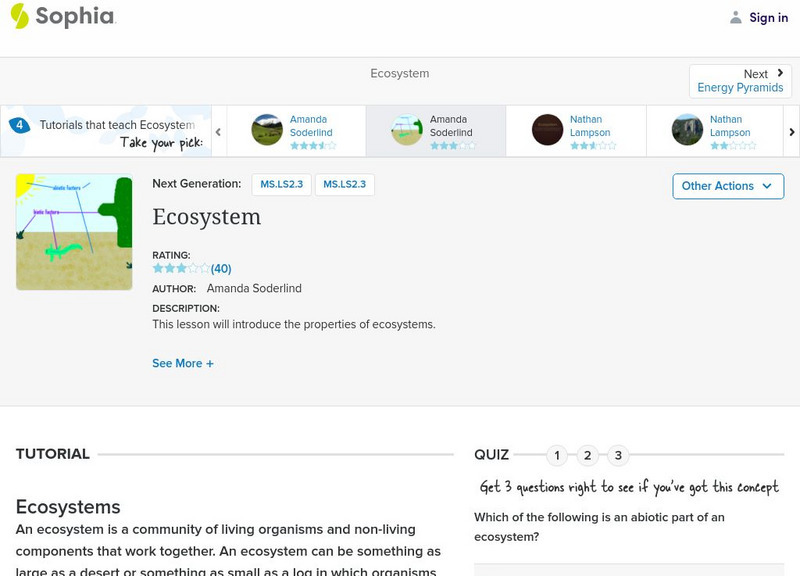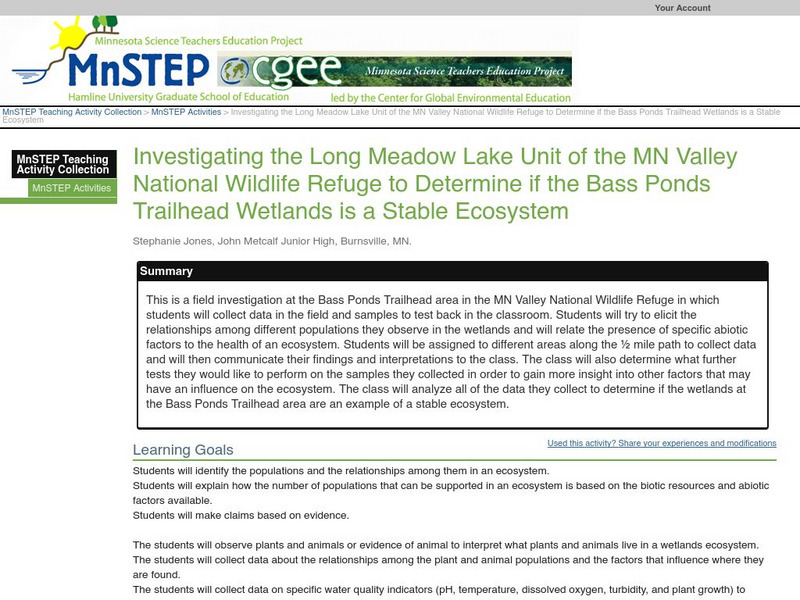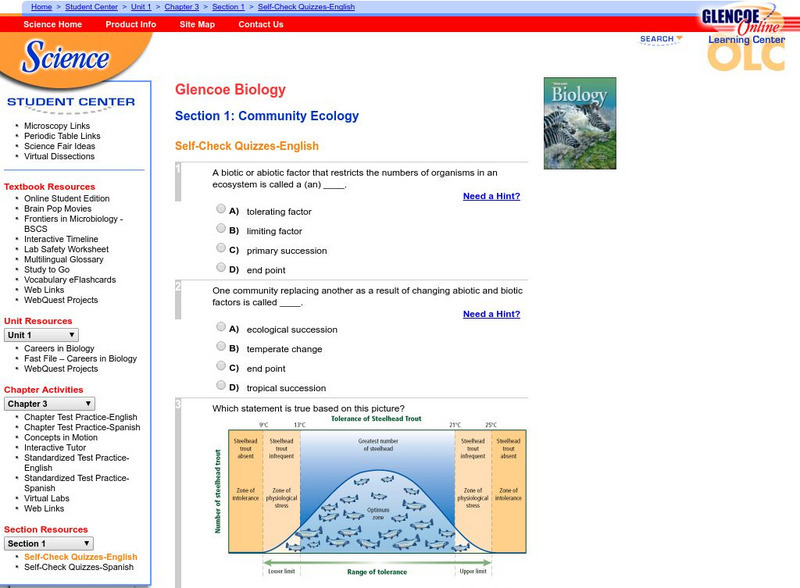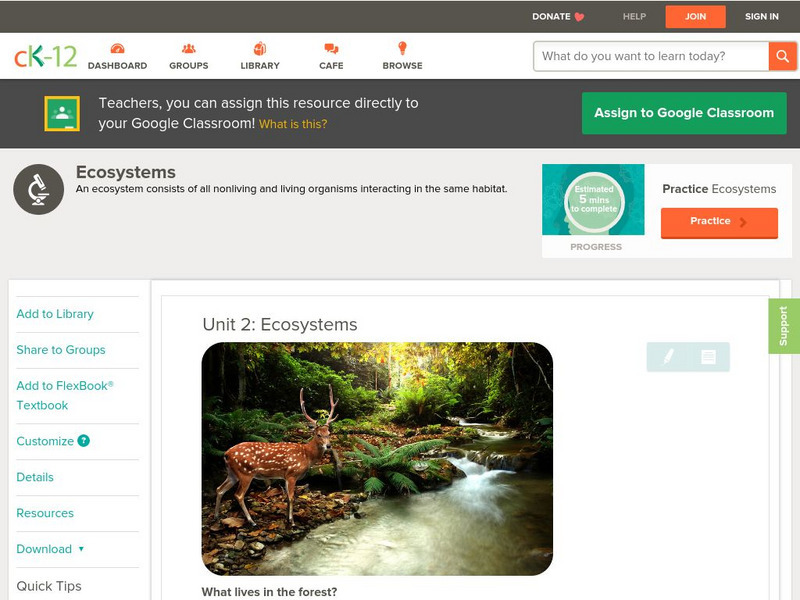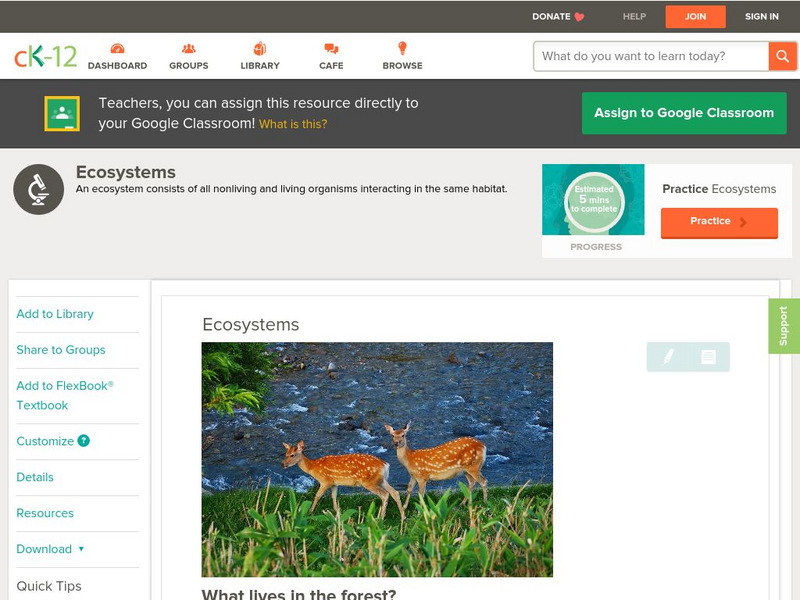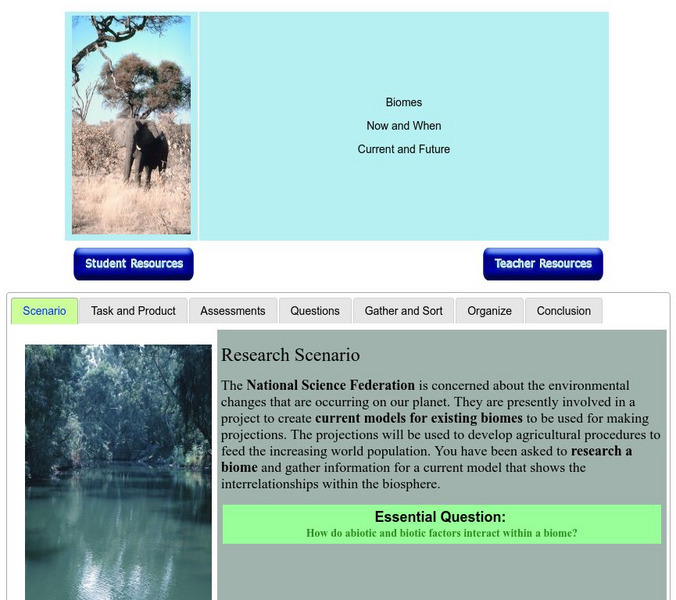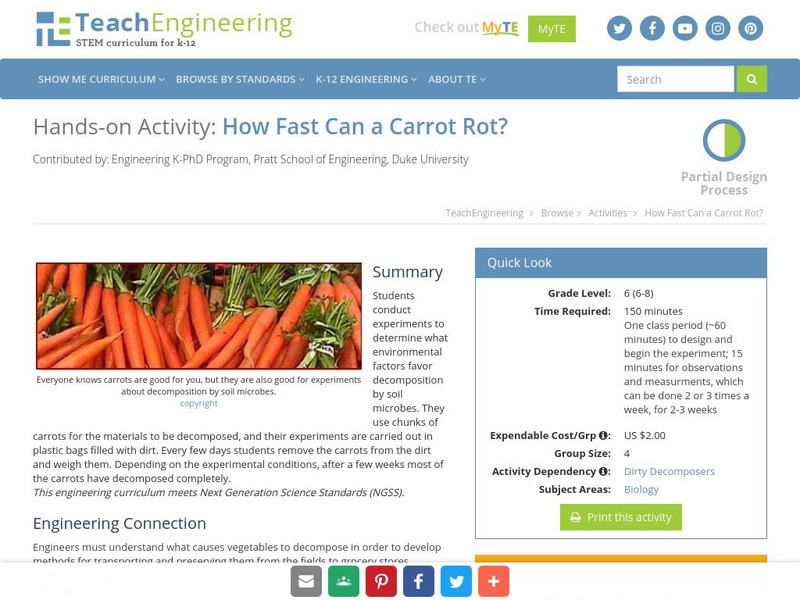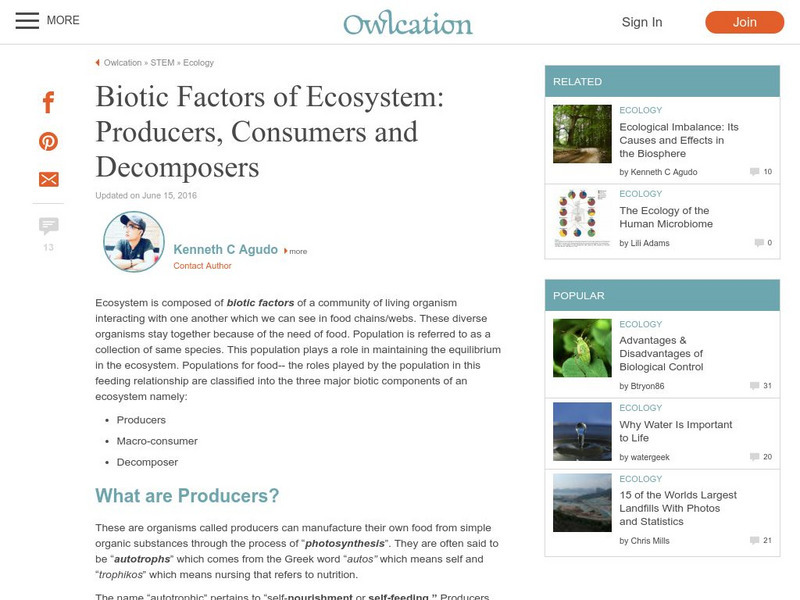Huntington Library
Huntington Library: Making Community Measurements: Abiotic Factors [Pdf]
A lesson plan in which students explore plant communities and observe different types of soil and weather conditions in an attempt to determine cause and effect relationships. Includes discussion questions, extension activities and web...
Huntington Library
Huntington Library: Making Community Measurements: Biotic Factors [Pdf]
A lesson plan in which students explore plant communities and observe and classify different types of vegetation. Includes discussion questions, extension activities and web links, a vocabulary glossary, and handouts.
Sophia Learning
Sophia: Abiotic and Biotic Factors: Lesson 4
This lesson will introduce abiotic and biotic factors, giving examples and comparing/contrasting the two. It is 4 of 4 in the series titled "Abiotic and Biotic Factors."
Sophia Learning
Sophia: Abiotic and Biotic Factors: Lesson 1
This lesson will introduce abiotic and biotic factors, giving examples and comparing/contrasting the two. It is 1 of 4 in the series titled "Abiotic and Biotic Factors."
National Geographic
National Geographic: Ocean Abiotic Factors
Students define and provide examples of abiotic and biotic factors of different ecosystems. Then they investigate the importance of abiotic factors and physical processes within ocean ecosystems.
Sophia Learning
Sophia: Ecosystems
Gives basic information about the community that forms between living and non-living factors that function together in an ecosystem. [47 secs]
Science Education Resource Center at Carleton College
Serc: Investigating the Long Meadow Lake Unit of Valley Nat'l Wildlife Refuge
This is a field investigation at the Bass Ponds Trailhead area in the MN Valley National Wildlife Refuge in which middle schoolers will collect data in the field and samples to test back in the classroom. Students will try to elicit the...
Other
Digital Library for Earth System Education: Teaching Box: Seasonal Upwelling
A suite of lessons focusing on the process of upwelling. Inquiry-based exploration of seasonal upwelling includes marine food webs, food production in the ocean, wind-driven ocean currents, and seasonal changes in biotic and abiotic...
National Geographic
National Geographic: Symbiotic Relationships in Marine Ecosystems
In this lesson students analyze videos to make observations about species, populations, and communities of organisms and discuss their symbiotic relationships. Then they create a hypothetical marine ecosystem and describe the adaptive,...
CK-12 Foundation
Ck 12: Episd: Ecosystems
[Free Registration/Login may be required to access all resource tools.] Explore ecosystems and ecology on an introductory level uncovering fact about types of ecosystems and the competitive exclusion principle.
CK-12 Foundation
Ck 12: Episd: What Are Biomes?
[Free Registration/Login may be required to access all resource tools.] Students will consider the influences that create different biomes. Recognize and classify the types of biomes.
McGraw Hill
Glencoe Biology: Community Ecology: Self Check Quiz
Answer these five multiple-choice questions about community ecology. After answers are submitted, students can review their mistakes.
CK-12 Foundation
Ck 12: Biology: Ecosystems
[Free Registration/Login may be required to access all resource tools.] Introduction to ecosystems and other ecological concepts.
CK-12 Foundation
Ck 12: Biology: Ecosystems
[Free Registration/Login may be required to access all resource tools.] Introduction to ecosystems and other ecological concepts.
Soft Schools
Soft Schools: Biodiversity Quiz (Ecological Problems)
Take an interactive quiz over ecological problems affecting the environment. After completing the quiz, check your score, and then revisit any incorrect question for further review.
CK-12 Foundation
Ck 12: Biology: Ecosystems
[Free Registration/Login may be required to access all resource tools.] Introduction to ecosystems and other ecological concepts.
Other
Baltimore County Public Schools: Biomes: Now and When (Online Research Model)
Biomes lesson designed to answer the question, how do abiotic and biotic factors interact within a biome? integrates biological concepts with literacy knowledge and skills. Includes directed questions, assessment guides, project...
TeachEngineering
Teach Engineering: How Fast Can a Carrot Rot?
Students conduct experiments to determine what environmental factors favor decomposition by soil microbes. They use chunks of carrots for the materials to be decomposed, and their experiments are carried out in plastic bags filled with...
Other
Hub Pages: Abiotic Factors: A Component of Ecosystem
In the environment, there are external factors that really affect organisms living within it. One of these factors is the set of abiotic factors, or nonliving variables, such as wind, ocean, day length, rainfall, temperature, and ocean...
Science Struck
Science Struck: Abiotic Factors of the Rainforest
Abiotic factors, e.g., sunlight and precipitation, play a huge role in supporting biodiversity in a rainforest. This article discusses the features of rainforests and how abiotic factors affect the plants and animals that live there.
Other
Hub Pages: Biotic Factors of Ecosystem: Producers, Consumers and Decomposers
An ecosystem is composed of biotic factors of a community of living organisms interacting with one another which we can see in food chains/webs. These diverse organisms stay together because of the need of food. Population is referred to...
Scholastic
Scholastic: Study Jams! Science: Ecosystems
A video and a short multiple-choice quiz on the topic of ecosystems, covering biotic and abiotic factors, and the roles organisms play in an ecosystem.
Utah Education Network
Uen: Habitat Alterations of a Riparia
This field trip is designed to physically immerse students in the concept of habitat alteration focusing on biotic and abiotic habitat alterations.
Texas Instruments
Texas Instruments: Glencoe Middle School Science: Biodiversity and Ecosystems
Students will conduct a field investigation to learn about the environment. They will observe biotic and abiotic factors of an ecosystem. Students can use the CBL 2 and a temperature probe to collect data and a graphing calculator to...
Other popular searches
- Biotic Abiotic
- Biotic and Abiotic Factors
- Biotic and Abiotic
- Abiotic Biotic Environment
- Abiotic and Biotic Elements
- Abiotic and Biotic Resources
- Biotic Abiotic Factors
- Abiotic Biotic Lab
- Ecosystems Abiotic Biotic
- Biotic Abiotic Pictures
- Biotic Abiotic Piotures
- Biotic or Abiotic Changes


![Huntington Library: Making Community Measurements: Abiotic Factors [Pdf] Lesson Plan Huntington Library: Making Community Measurements: Abiotic Factors [Pdf] Lesson Plan](https://d15y2dacu3jp90.cloudfront.net/images/attachment_defaults/resource/large/FPO-knovation.png)



